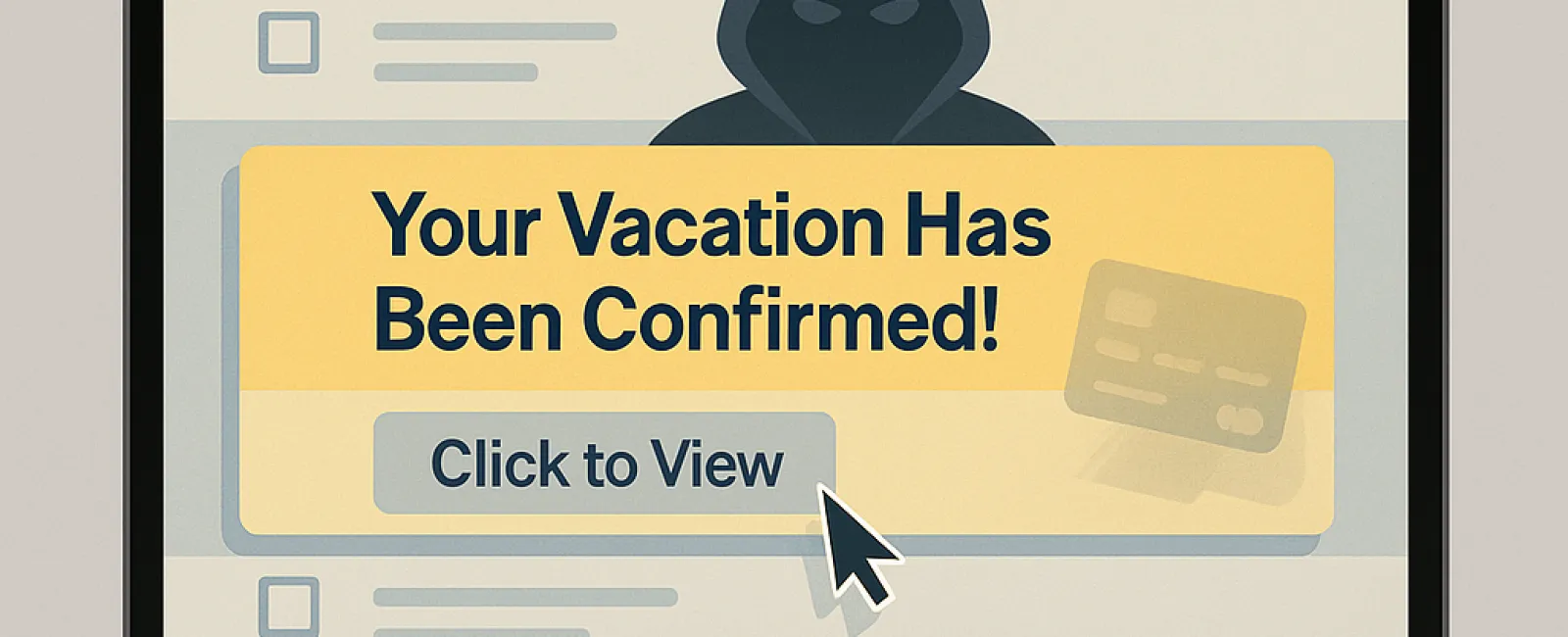May 12, 2025
Planning a Vacation This Year? Watch Out for Fake Confirmation E-mails!
Summer is almost here—and while you're planning flights, hotels, and rental cars, cybercriminals are planning their next move.
Scammers are exploiting travel season by sending fake booking confirmations that look shockingly real. These e-mails impersonate trusted companies like Delta, Expedia, or Marriott to steal your personal and financial information, hijack your accounts, or infect your device with malware.
Even tech-savvy travelers are getting duped.
How the Scam Works
Step 1: A Fake Booking Confirmation Hits Your Inbox
It looks legit. The e-mail may appear to come from well-known travel brands and often includes:
-
Official logos and formatting
-
Spoofed sender addresses
-
"Customer support" phone numbers
Common subject lines include:
-
"Your Trip To Miami Has Been Confirmed - Click Here For Details"
-
"Important: Your Flight Itinerary Has Changed"
-
"Action Required: Confirm Your Hotel Stay"
-
"Final Step: Complete Your Rental Car Reservation"
Step 2: You Click a Link to "Verify" Your Info
The e-mail urges you to log in, confirm your booking, or update payment details. But the link leads to a fake website designed to steal your credentials.
Step 3: Your Info—or Your Device—is Compromised
Once you enter login or payment info, hackers gain access to:
-
Airline, hotel, or travel agency accounts
-
Your credit card details
-
Your device, if the e-mail contained malware
Why This Scam Is So Effective
-
It Looks Authentic: Perfectly mimics real confirmation e-mails
-
It Plays on Urgency: Makes you act fast with fear of missed reservations
-
You're Distracted: Planning a trip or juggling work makes it easy to overlook red flags
It's Not Just Personal—It's a Business Risk Too
If your team travels for work, this scam becomes a serious threat. Office managers, executive assistants, or travel coordinators often handle all bookings—and receive countless confirmation e-mails.
One wrong click could:
-
Expose company credit card info
-
Compromise corporate travel accounts
-
Introduce malware into your business network
How to Protect Yourself and Your Business
✅ Verify Before You Click
Never click on links in e-mails. Instead, go directly to the travel provider's website.
✅ Check the Sender's Address
Scammers use lookalike domains like @deltacom.com instead of @delta.com.
✅ Train Your Team
Educate employees—especially those handling travel—on how to spot phishing scams.
✅ Enable Multi-factor Authentication (MFA)
MFA adds a critical layer of protection even if credentials are stolen.
✅ Secure Business E-mail Accounts
Use enterprise-grade e-mail security to block malicious links and attachments.
Don't Let a Fake Travel E-mail Derail Your Business
Cybercriminals strike when you're least expecting it—and travel season is prime time.
If anyone on your team books work-related travel or manages expense reports, you're a target.
Start protecting your business now with a FREE Cybersecurity Assessment.
We'll check for vulnerabilities, strengthen your defenses, and help keep your data safe.
👉 [Click here to schedule your FREE assessment today!]

